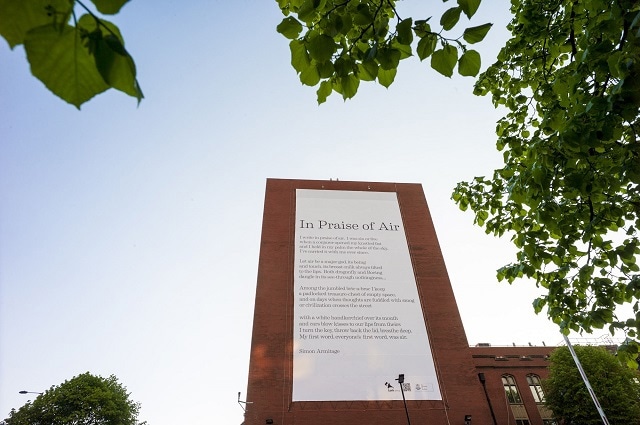
Image Credit: Linda Bussey/University of Sheffield
Air pollution is currently estimated to reduce the life expectancy of everyone in the UK by around 7 to 8 months, with people living in busy towns and cities being the worst affected. With this in mind, academics from the University of Sheffield’s Department of Chemistry and School of English have joined forces in order to create the world’s first air-cleaning poem which uses revolutionary nano-technology.
In Praise of Air
The multi-disciplinary project was inspired by the University’s altruistic aim to allow people to clean-up the air pollution around them as they go about their daily business by utilising cutting-edge technology. The poem entitled ‘In Praise of Air’ was written by Simon Armitage, an award winning writer and Professor of Poetry at the University of Sheffield, and overlooks the busy A57 road which runs through the centre of the campus.
In Praise of Air by Simon Armitage
An Absorbing Read
Tony Ryan, Professor of Physical Chemistry and the Pro-Vice Chancellor of the Faculty of Science at the University of Sheffield, originally came up with the idea of using materials to cleanse the air. Tony and his team at the University created and developed the material for the giant banner on which the poem is printed. This material can remove the nitrogen oxide pollution created by 20 cars every day using revolutionary nano-technology.
The poem is coated with microscopic titanium particles which allow it to act as a photocatalyst, using light and oxygen to react with nitrogen oxide pollutants in order to purify the surrounding air. The coating on the poem can use sunlight as well as artificial light, from street lights and car heads lights, in order to remove pollution from its surroundings.
This is a fun collaboration between science and the arts to highlight a very serious issue of poor air quality in our towns and cities. The science behind this is an additive which delivers a real environmental benefit that could actually help cut disease and save lives.
Tony Ryan - Professor of Physical Chemistry at the University of Sheffield
When light shines on the poem, electrons in the material are rearranged and become increasingly reactive, meaning they are able to interact with the oxygen in the air in order to break it apart into 2 extremely reactive oxygen molecules, known as free radicals. The oxygen free radicals then react with water in order to create peroxide. Peroxide then in turn oxidises the pollutants in the surrounding air, thus creating harmless molecules which can be safely washed away.
Off The Wall Technology
Previously, photocatalysts have been integrated into commercially available products such as paints, cements and paving stones, in order to reduce air pollution but ‘In Praise of Air’ is the world’s first photocatalytic poem.
The roadside advertising boards and posters which people pass every day on their daily commutes could be easily transformed in order to clean-up the surrounding environment. Just one square meter of this innovative material is enough to remove around 2 grams of nitrogen oxide per day from the air.
The material developed at the University of Sheffield is relatively inexpensive – it would cost less than £100 to replace each existing advertising poster. If this new technology was implemented up and down the UK today, the amount of pollution produced on congested roads would be dramatically cut overnight.
‘In Praise of Air’ will be displayed on the Alfred Denny Building at the University of Sheffield until May 2015.
This Article Around the Web
References and Further Reading